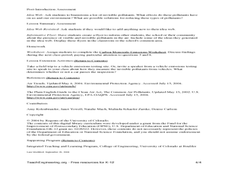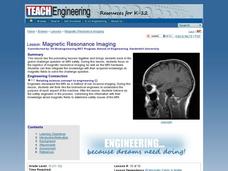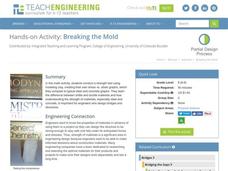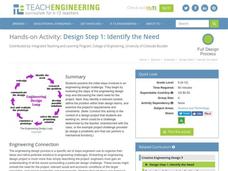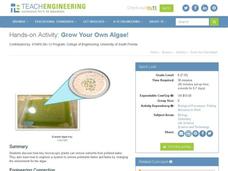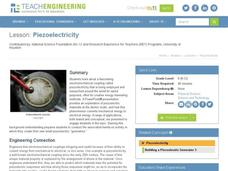Curated OER
Swinging Pendulum
Students engage in an activity which demonstrates how potential energy (PE) can be converted to kinetic energy (KE) and back again. Given a pendulum height, students calculate and predict how fast the pendulum will swing by understanding...
Teach Engineering
Equal and Opposite Thrust in Aircraft: You're a Pushover!
It's the law—every action requires a reaction, no matter how small. Pupils experience two demonstrations of Newton's third law of motion as it relates to thrust in the 10th segment of a 22-part unit on flight. Using their mathematical...
Curated OER
I Don't Believe My Eyes!
Young scholars develop their understanding of the effects of invisible air pollutants. In this invisible air lesson, students complete experiments with a rubber band air test, a bean plant experiment and by exploring engineering roles...
Teach Engineering
Just Plane Simple
It is plane to see that simple machines help reduce the force needed to perform a task. This resource introduces three of the simple machines--the inclined plane, the wedge, and the screw, and the formulas in order to be able...
Teach Engineering
Magnetic Resonance Imaging
The capstone lesson in a 14-part series focuses on the basics of magnetic resonance imaging and the hardware of the machines. Pupils use this information and the material learned throughout the unit to develop a presentation on...
Teach Engineering
Air Under Pressure
Introduce your class to air masses and how they affect the weather with a lesson that focuses on the differences between high and low air pressure systems. The class explores actual weather data using archived weather data.
Curated OER
The Solstices
Compare surface temperatures when the solstice occurs in the different hemispheres. Young scientists draw conclusions from their investigation of data collected using spreadsheets and a globe.
Curated OER
Recombination and Pedigrees
Biology aces answer four questions about genetic recombination and nine questions about pedigrees. This worksheet is very focused on these two topics. Most of the pedigree questions relate to the genetic disorders, Alkaptonuria and...
Teach Engineering
Gumdrop Atoms
There's nothing sticky about the resource, unless you count the gumdrops! Scholars create a model of a lithium atom, complete with protons, neutrons, and electrons. It's just that these models are made with gumdrops and toothpicks.
Federal Reserve Bank
Financial Fables: Shopping Wisely with Olivia Owl
Cover two subjects with one lesson! First, dive into English language arts; read an eBook, answer comprehension questions, and complete a cause and effect chart about the financial fable, Shopping Wisely with Olivia Owl. Then, take...
Teach Engineering
Archimedes' Principle, Pascal's Law and Bernoulli's Principle
What do Pascal's law, Archimedes' Principle, and Bernoulli's Principle have to do with fluid mechanics? The included PowerPoint presentation provides the basic definitions and equations associated with the three. A set of homework...
Teach Engineering
Slinkies as Solenoids
What does an MRI machine have to do with a slinky? This activity challenges learners to run a current through a slinky and use a magnetic field sensor to measure the magnetic field. Groups then change the length of the slinky to see...
Teach Engineering
Breaking the Mold
A little too much strain could cause a lot of stress. Groups conduct a strength test on clay. Using books as weights, pupils measure the compression of clay columns and calculate the associated strain and stress. Teams record their...
Teach Engineering
The Challenge Question
A research position becomes a modeling job. The introductory lesson in a series of nine presents the challenge of analyzing a set of bivariate data. The class brainstorms what the data may represent. Pupils must decide what is needed to...
Teach Engineering
Go Public: Osteoporosis Brochure
Osteoporosis and family — notice the connection between the two. Pairs develop a brochure to educate the public about osteoporosis in the last portion of the six-part series. The teams draw on the information learned throughout the...
Teach Engineering
Using Hooke's Law to Understand Materials
Provide a Hooke for a lesson on elasticity with an activity that has groups investigate a set of springs. They use a set procedure to collect data to calculate the spring constant for each spring using Hooke's Law. The groups...
Teach Engineering
Viscous Fluids
Elasticity and viscosity. Help your class understand the similarities and differences with an introduction to viscous fluids. After describing four types of fluid behaviors: shear thinning, shear thickening, Bringham plastic,...
Teach Engineering
Microfluidic Devices and Flow Rate
When you have to flow, you have to flow. The lesson introduces class members to microfluidic devices and their uses in medicine. They watch a short video on how the diameter affects the rate of flow. The worksheet has individuals...
Teach Engineering
Measuring Surface Tension
How do you measure surface tension? The fifth installment of a nine-part series is an experiment where young scientists use tubes of different sizes to measure surface tension. They calculate the average and standard deviation of the...
Teach Engineering
Design Step 1: Identify the Need
What exactly does an engineer do? Learners find out through a lesson that asks them to solve a problem that affects a target population. Aspiring engineers learn the steps of the engineering design process as they apply it...
Teach Engineering
Aerogels in Action
Model an oil spill cleanup. An engaging engineering lesson has groups using aerogels to simulate an oil spill cleanup (vegetable oil in water). Along the way, they learn about nanotechnology and hydrophilia/hydrophobia.
Teach Engineering
Grow Your Own Algae!
Develop a model of a wastewater treatment center. The last activity of the unit has pupils mix a lake water sample into a tank of water containing fertilizers. Over time, the algae from the lake water grows and removes the nutrient-rich...
Teach Engineering
Piezoelectricity
What effect makes children's shoes light up? Answer: Piezoelectric effect. Here is a PowerPoint presentation that describes piezoelectric materials as being able to convert mechanical energy to electrical energy. Individuals learn how...
Teach Engineering
Chair Design
Can you design the perfect chair? Scholars apply the engineering design process to design and build a prototype of a new type of chair from wires. They test their designs with a wooden artist model or stuffed animal.


